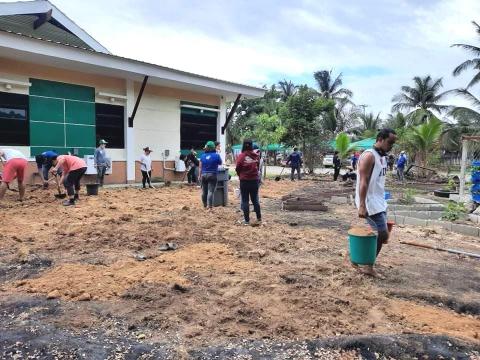Participated by the five sections of the center namely Admin & Finance Unit (AFU), Planning, Monitoring and Evaluation Unit (PMEU), Information Services (IS), Career Development and Management Services (CDMS), and Partnership and Accreditation Services (PAS), the center’s effort to intensify planting and gardening activity among the management and staff is to also make vegetables available and be productive while on community quarantine. (photo provided by OIC-Info Chief Maria Eloisa Akut)
ATI compound, EL SALVADOR CITY---Armed with gardening implements to establish another garden area, the management and staff of the Agricultural Training Institute-Regional Training Center X (ATI-RTC X) convened on Thursday June 4 to make garden beds and plant vegetables in support to the “Urban Agriculture Program” and “Plant, Plant, Plant Program” of the Department of Agriculture (DA).
The center through the leadership of OIC-Center Director Maria Lydia A. Echavez took part of the gardening initiative to strengthen the implementation of the aforementioned programs in the region. The programs intend to localize food production to make food available, accessible, affordable, safe and provide additional income to urban areas. The “Plant, Plant, Plant Program” is implemented to increase the country’s food adequacy level during the emergency situation resulting from the recent pandemic.
Since its earlier gardening efforts, two of the gardening methods the center have used include the popular square foot gardening and the conventional raised bed gardening.
Participated by the five sections of the center namely Admin & Finance Unit (AFU), Planning, Monitoring and Evaluation Unit (PMEU), Information Services (IS), Career Development and Management Services (CDMS), and Partnership and Accreditation Services (PAS), the center’s effort to intensify planting and gardening activity among the management and staff is to also make vegetables available and be productive while on community quarantine.
The garden area will then serve as a source of planting materials and seedlings which will be distributed as starter kits for extension support. It will also serve as practicum area during face-to-face training to complement classroom learning, as venue for practical and hands-on learning experience for immediate use, field visit area for other farmers, ATI training participants and others interested in farming, gardening and agriculture in general.
The center continuously distributes vegetable seedlings along with IEC materials to communities for the development of their communal gardens.

